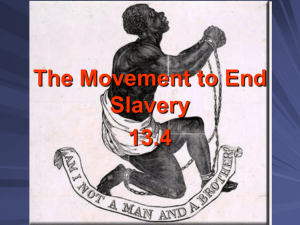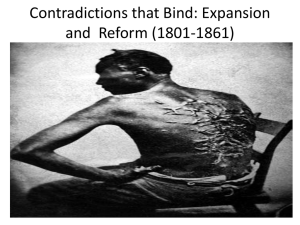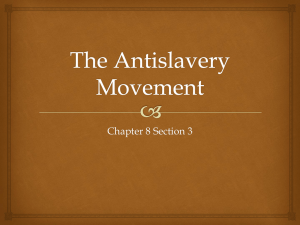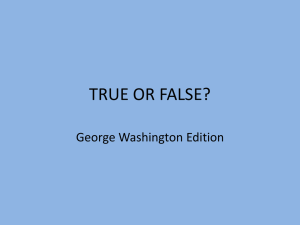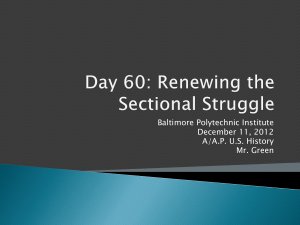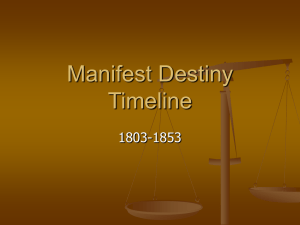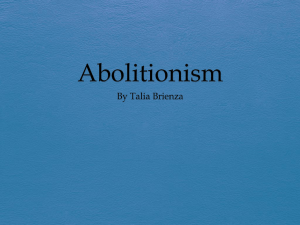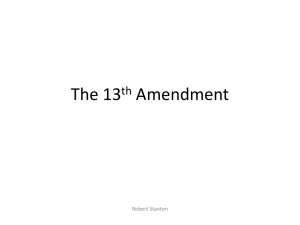The Fight Against Slavery
advertisement
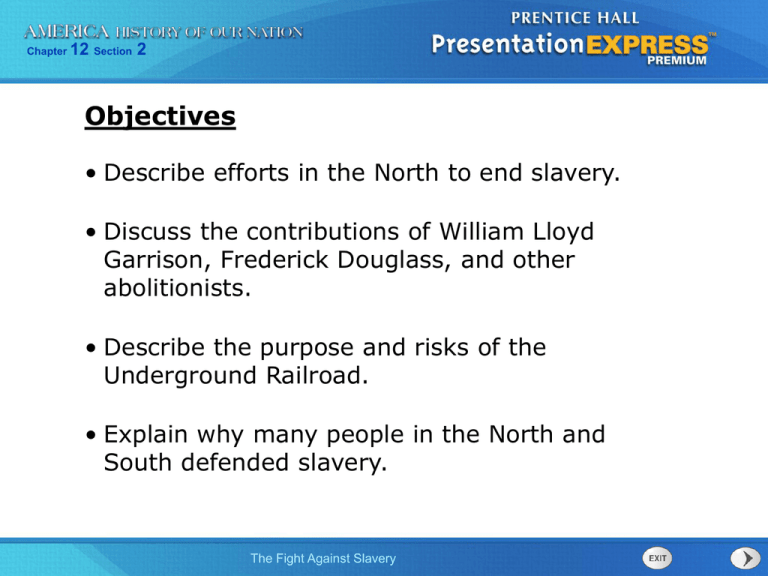
Chapter 12 Section 2 Objectives • Describe efforts in the North to end slavery. • Discuss the contributions of William Lloyd Garrison, Frederick Douglass, and other abolitionists. • Describe the purpose and risks of the Underground Railroad. • Explain why many people in the North and South defended slavery. The Fight Against Slavery Chapter 12 Section 2 Terms and People • abolitionists – reformers who wanted to abolish, or end, slavery • William Lloyd Garrison – a Quaker who launched an abolitionist newspaper, The Liberator, and cofounded the New England Anti-Slavery Society • Frederick Douglass – a former slave who spoke out against slavery and published an antislavery newspaper, North Star • Harriet Tubman – a former slave who helped many slaves escape via the Underground Railroad The Fight Against Slavery Chapter 12 Section 2 Set Questions: Think back to Section 1 Page 414 1. List three social reform movements during this time period. 2. What was the movement to stop alcohol abuse? 3. What was the religious movement we discussed in section 1? 4. What is a Utopian Community? 5. Who was an early champion (someone who pushed for) of public education? The Fight Against Slavery Chapter 12 Section 2 How did abolitionists try to end slavery? Since colonial times, some Americans had opposed slavery on religious and moral grounds. Abolitionists tried to end slavery through the political system, the press, and nongovernmental antislavery organizations. The Fight Against Slavery Chapter 12 Section 2 Early Opposition A number of prominent leaders of the early republic, such as Alexander Hamilton and Benjamin Franklin, opposed slavery. In 1790, Pennsylvania became the first state to pass a law that gradually eliminated slavery. By 1804, every northern state had ended or pledged to end slavery, and Congress had banned slavery in the Northwest Territory. The Fight Against Slavery Chapter 12 Section 2 Liberia The American Colonization Society, an early antislavery organization, wanted to free slaves gradually and transport them to Liberia, a colony founded in 1822 on the west coast of Africa. The Fight Against Slavery Chapter 12 Section 2 The colonization movement did not work because most enslaved people had grown up in the U.S. and did not want to leave. By 1830, only about 1,400 African Americans had migrated to Liberia. The Fight Against Slavery Chapter 12 Section 2 Abolitionism By the mid1800s, a small but growing number of people were abolitionists who called for an immediate end to slavery. The Second Great Awakening inspired further opposition to slavery. The Fight Against Slavery Chapter 12 Section 2 David Walker, a northern African American, published a pamphlet called Appeal: to the Coloured Citizens of the World. He urged enslaved people to rebel, if necessary, to gain their freedom. The Fight Against Slavery Chapter 12 Section 2 William Lloyd Garrison opposed the use of violence to end slavery because he was a Quaker. Yet, he was more radical than most, because he thought all African Americans should have full political rights. In 1831, Garrison launched an abolitionist newspaper, The Liberator, which folded only after slavery had ended. The Fight Against Slavery Chapter 12 Section 2 Garrison cofounded the New England Anti-Slavery Society—which later became the American AntiSlavery Society—whose members included: • Minister Theodore Weld, a pupil of Charles Finney • Sarah and Angelina Grimke, daughters of a South Carolina slaveholder The Fight Against Slavery Chapter 12 Section 2 Former president John Quincy Adams, now a congressman, also supported the abolitionists. • In 1839, he proposed a constitutional amendment that would ban slavery in any new state joining the Union, but the amendment was not passed. • In 1841, Adams defended captive Africans who had seized the slave ship Amistad and helped them regain their freedom. The Fight Against Slavery Chapter 12 Section 2 Frederick Douglass One of the most powerful speakers for abolitionism was Frederick Douglass. A former slave, Douglass escaped to the North and risked recapture by speaking at antislavery rallies. Douglass also published his own antislavery newspaper, the North Star. The Fight Against Slavery Chapter 12 Section 2 Underground Railroad Some abolitionists helped people escape from slavery via the Underground Railroad. The Underground Railroad was a network of people who secretly helped slaves reach freedom. The Fight Against Slavery Chapter 12 Section 2 Working for the Underground Railroad was illegal and dangerous, and people risked their lives to help runaway slaves. As many as 50,000 African Americans escaped from slavery to freedom in the North or in Canada via the Underground Railroad. The Fight Against Slavery Chapter 12 Section 2 The fugitive slaves were led by “conductors.” They stopped at “stations,” which were often abolitionists’ houses, or churches or caves. Supporters donated clothing, food, and money. The Fight Against Slavery Chapter 12 Section 2 The Fight Against Slavery Chapter 12 Section 2 The Fight Against Slavery Chapter 12 Section 2 Harriet Tubman was the most famous conductor on the Underground Railroad. She personally helped more than 300 slaves escape to freedom. Slave owners tried to stop her, offering a $40,000 reward for her capture, but she was never caught. The Fight Against Slavery Chapter 12 Section 2 Abolitionists faced powerful obstacles in the North as well as in the South. Many northerners relied on cotton produced in the south by slave labor. The Fight Against Slavery Northerners also feared that freed slaves would take their jobs. Chapter 12 Section 2 Defenders of slavery began to act with greater force. • Northern supporters of slavery sometimes attacked people at antislavery meetings. • The state of Georgia offered a $5,000 reward for the arrest and conviction of William Lloyd Garrison for libel. Southerners in Congress won passage of a “gag rule” that blocked discussion of antislavery petitions. The Fight Against Slavery Chapter 12 Section 2 Closing Questions: 1. What founding fathers disagreed with slavery? 2. Who published an anti-slavery newspaper in the North? 3. Why were this mans views more radical than most? 4. Who was the most famous conductor of the Underground Railroad? 5. What is a station in terms of the Underground Railroad? The Fight Against Slavery Chapter 12 Section 2 Section Review QuickTake Quiz The Fight Against Slavery Know It, Show It Quiz
